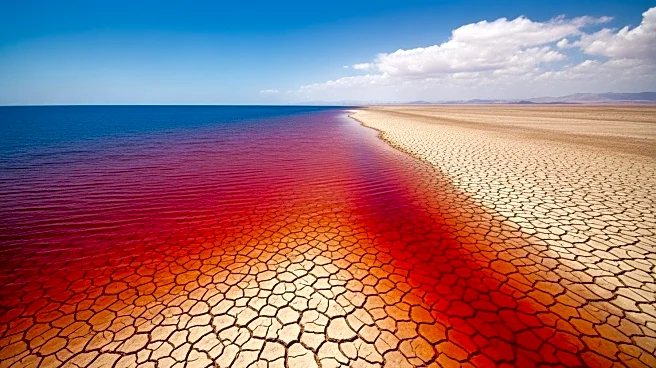What is the story about?
What's Happening?
Scientists at King Abdullah University of Science and Technology (KAUST) have uncovered evidence that the Red Sea completely dried out approximately 6.2 million years ago before being refilled by a massive flood from the Indian Ocean. This event, which occurred over a span of about 100,000 years, transformed the Red Sea from a salt-filled basin back into a marine environment. The research utilized seismic imaging, microfossil evidence, and geochemical dating to pinpoint this dramatic geological change. The findings, published in Communications Earth & Environment, highlight the Red Sea's unique geological history, including its initial connection to the Mediterranean Sea and subsequent isolation and desiccation.
Why It's Important?
The study of the Red Sea's past provides valuable insights into the processes that shape ocean basins and influence global marine environments. Understanding such historical events is crucial for comprehending how oceans form and evolve, as well as how they respond to climatic and tectonic changes. The Red Sea's history of desiccation and reflooding serves as a natural laboratory for studying these phenomena. The research underscores the region's resilience and its ability to recover from extreme environmental conditions, offering lessons on marine ecosystem restoration and sustainability.
What's Next?
Further research may focus on exploring the long-term impacts of such dramatic geological events on marine biodiversity and ecosystem dynamics. Scientists could investigate how similar processes might affect other ocean basins and contribute to global oceanographic changes. Additionally, the findings may prompt further studies on the interaction between tectonic activity and climate change, providing a broader understanding of Earth's geological history.
Beyond the Headlines
The Red Sea's history of drying and reflooding highlights the complex interplay between geological and environmental factors. This event serves as a reminder of the Earth's dynamic nature and the potential for significant changes in marine environments. The study also emphasizes the importance of interdisciplinary research in uncovering the intricate details of Earth's past, which can inform future conservation and management strategies for marine ecosystems.















